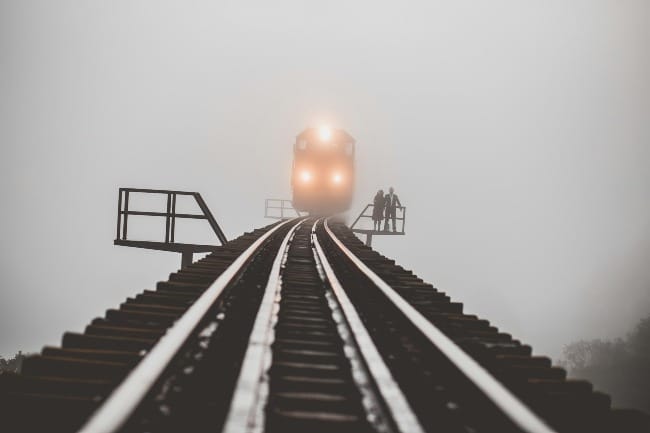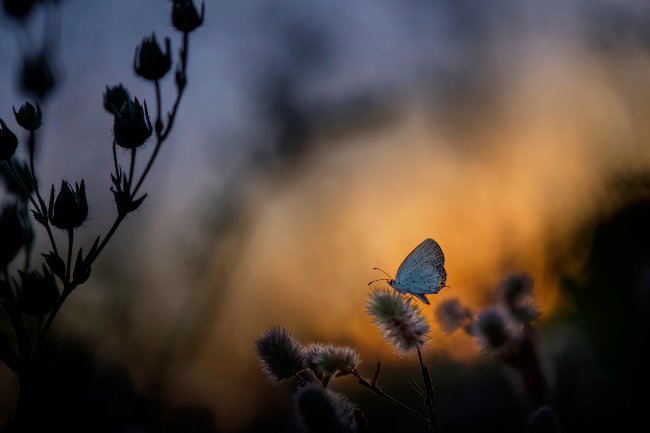David Whyte is an Anglo-Irish poet, a long-time Pacific Northwest resident of Washington State, and a part-time resident of County Clare, Ireland, to which he returns every year. His writing and lectures explore what he calls the "conversational nature of reality," an idea that what I desire and what you desire meet and form a distinct reality when those desires and lives intersect and interact. As Whyte says, "we don’t get to choose so often between things we hope we can choose between." In other words, we don't get to arbitrate reality on our own individual terms.
In the "Blessings & Prayers" section of his book, The Bell and the Blackbird, he explores how we respond to the settings of our lives and what blesses and sustains us. Two poems in this section, "Blessing for Sound," and "Blessing for Light," are particularly good companions, and have been paired together in this post and in the video I share at the end of this post.
As you read through the poems, think about your particular experiences of sound and light when you wake in the morning. What do they bring to you and your experience that would be lost to you without these particular ways of being acquainted with the world? Are there other ways of being acquainted with the world that are important to you?

Blessing for Sound
by David Whyte
I thank you,
for the smallest sound,
for the way my ears open
even before my eyes,
as if to remember
the way everything began
with an original, vibrant, note,
and I thank you for this
everyday original music,
always being rehearsed,
always being played,
always being remembered
as something new
and arriving, a tram line
below in the city street,
gull cries, or a ship’s horn
in the distant harbour,
so that in waking I hear voices
even where there is no voice
and invitations where
there is no invitation
so that I can wake with you
by the ocean, in summer
or in the deepest seemingly
quietest winter,
and be with you
so that I can hear you
even with my eyes closed,
even with my heart closed,
even before I fully wake.
from The Bell and the Blackbird by David Whyte
The primacy of sound is a theme of this poem—the sounds that are ever-changing in their combination around us, "everyday original music, always being rehearsed, always being played." Outside my own door, I may hear a junco clicking, wind in the cedar tree, cars passing on the freeway (the volume dependent on the season), a dog barking, insects buzzing, even an owl hooting. But, as the poem points out, the sounds are never in exactly the same combination. By listening well, I can hear the individual sounds of that particular day, the "original music" of that time and place. The sounds you hear outside your home today are not the same sound combinations you heard yesterday, or even in the last hour. Because of the ever-changing collection of participants, there is always something new to be heard.
The attitude of expectation, of "something new always arriving," is a way of approaching a new day that contrasts to waking with anxious thoughts of what the day might bring. Hearing voices/even where there is no voice/and invitations where/there is no invitation, suggests an attitude of openness and expectation that greets the day with hope—even with my eyes closed/even with my heart closed/even before I fully wake.
A different type of "waking up" is explored in the poem, Blessing for the Light. According to Whyte, the coming of light into our world deeply changes our experience in it, and even affects our love for what it enables us to see more distinctly.

Blessing for the Light
by David Whyte
I thank you, light, again,
for helping me to find
the outline of my daughter’s face,
I thank you light,
for the subtle way
your merest touch gives shape
to such things I could
only learn to love
through your delicate instruction,
and I thank you, this morning
waking again,
most intimately and secretly
for your visible invisibility,
the way you make me look
at the face of the world
so that everything becomes
an eye to everything else
and so that strangely,
I also see myself being seen,
so that I can be born again
in that sight, so that
I can have this one other way
along with every other way,
to know that I am here.
from The Bell and the Blackbird by David Whyte
In The Blessing for the Light, as he did in The Blessing for Sound, Whyte examines a mode of experiencing the world—in this case, vision—exploring how light enables familiarity, and even affection. Light's presence makes things more knowable to us as we recognize familiar outlines and shapes. It takes just a touch of this "visible invisibility" to enable us to see what would be less distinct and more formless in darkness.
your merest touch gives shape
to such things I could
only learn to love
through your delicate instruction
These blessing poems point us toward a stance of gratitude for the ways our experience of the world comes to us. It is easy, as humans, to approach our lives wanting something besides our particular life, even wishing to be a different creature than we are.
As Whyte said in an interview,
One of the interesting qualities of being human is, by the look of it, we’re the only part of creation that can actually refuse to be ourselves. As far as I can see, there’s no other part of the world that can do that. The cloud is the cloud; the mountain is the mountain; the tree is the tree; the hawk is the hawk. The kingfisher doesn’t wake up one day and say, “You know, God, I’m absolutely fed up to the back teeth of this whole kingfisher trip. Can I have a day as a crow? You know, hang out with my mates, glide down for a bit of carrion now and again? That’s the life for — ” No, the kingfisher is just the kingfisher...And one of the healing things about the natural world to human beings is that it’s just itself.
Becoming more aware of what goes into our experience, and being grateful for it, is a constructive practice that can help us be more like the kingfisher or the tree, more contented in being ourselves, not so that we become passive, but so that we can see what is coming as an opportunity, a chance to know that I am here, alive, and able to act in this world.
In the video below, made for Emergence Magazine, these two Blessing poems, landscape cinematography, and a musical score which incorporates a 1905 wax cylinder recording of an Irish song called, ‘Cé Phort Láirge’ (Waterford Quay) are combined into a lovely interpretation of Whyte's poetry. As the poet wanders the countryside, we are invited into the gentle blessing the words invoke. As the musician and composer of the musical score, Owen Ó Súilleabháin says, ‘The art of blessing, the art of calling in the invisible help of the divine, is ever present to the Celtic mind.’
May the words, the music and the scenes of this film encourage you to see the blessings that fill your world.
Louise
I would love to hear from you - contact me directly at info@circlewood.online.
